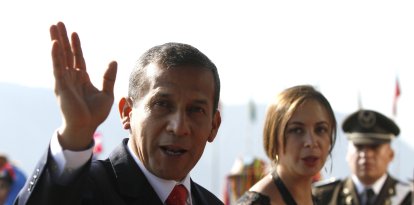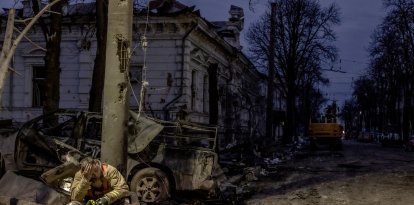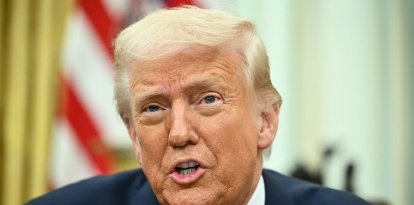The Carter Center assures that the Venezuelan election 'cannot be considered democratic' and condemns the Maduro regime's lack of transparency
The organization assured that it "cannot verify or corroborate the results of the election declared by the National Electoral Council."
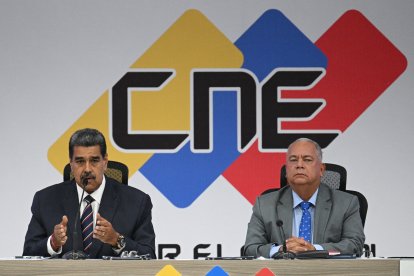
Dictator Nicolás Maduro together with the president of the CNE, Elvis Amoroso.
The Carter Center, the only recognized international observer that was accepted by the Nicolás Maduro regime to supervise the Venezuelan presidential election on July 28, issued a forceful statement assuring that the process "cannot be considered democratic."
🚨 | Según reportes de @CarterCenter, la misión técnica enviada a Venezuela no pudo verificar los resultados de las elecciones presidenciales del país y culpó a los funcionarios de una "completa falta de transparencia" al declarar ganador a Nicolás Maduro sin publicar los… pic.twitter.com/sp4Y4cPi1B
— VOZ (@VozMediaUSA) July 31, 2024
In the statement, the organization, which was officially recognized as an election observer by Maduro regime authorities a week ago, criticized the entire electoral process, including events that occurred during the campaign prior to July 28.
Hace solo 6 días Padrino López reconoció la integridad del @CarterCenter como observador electoral. Hoy esta institución confirma que la elección presidencial venezolana “no se adecuó a estándares internacionales de integridad electoral y no puede ser considerada democrática. https://t.co/cvU1njiied pic.twitter.com/sy3ZVd0EqU
— juanperreo 🏳️🌈 (@juanpecamara) July 31, 2024
First of all, the organization assured that it cannot verify the electoral results due to the lack of transparency of National Electoral Council (CNE), which is controlled by the Maduro regime.
"The Carter Center cannot verify or corroborate the results of the election declared by the National Electoral Council (CNE), and the electoral authority’s failure to announce disaggregated results by polling station constitutes a serious breach of electoral principles," reads the statement.
"Venezuela's electoral process did not meet international standards of electoral integrity at any of its stages and violated numerous provisions of its own national laws. The election took place in an environment of restricted freedoms for political actors, civil society organizations, and the media. Throughout the electoral process, the CNE demonstrated a clear bias in favor of the incumbent," the Carter Center wrote.
The blunt statement comes several hours after the Carter Center canceled the release of its first preliminary report on Venezuela and withdrew its staff from the South American country.
It also comes as the Venezuelan opposition, led by Maria Corina Machado, presented the electoral records to prove the massive triumph of opposition candidate Edmundo Gonzalez, who they claim surpassed dictator Maduro by millions of votes.
According to a new report from the opposition, which has already reviewed 80% of all the electoral records and is uploading them to a website so that Venezuelans and the international community can verify them, Edmundo Gonzalez Urrutia won the elections with 67% of the vote, equivalent to 7,086,966 votes. Maduro, on the other hand, only obtained 30%, or 3,206,164 votes.
The opposition's transparency effort contrasts with the opacity of the pro-government CNE, which, after more than 48 hours of announcing Maduro as the "winner," still has not published the electoral records on its web page and has not released the complete results, leaving the official numbers adrift.
The Carter Center, besides branding the elections as undemocratic, also questioned the steps taken by the regime prior to election day, including the obstacles to vote for Venezuelans living in exile and the favoritism shown by the CNE towards Maduro.
"The registration of parties and candidates also did not meet international standards. Over the past few years, several opposition parties have had their registrations changed to leaders who favor the government. This influenced the nomination of some opposition candidates. Importantly, the registration of the candidacy of the main opposition forces was subject to arbitrary decisions of the CNE, without respecting basic legal principles," the statement says.
Likewise, the organization also asserted that the electoral campaign "was impacted by unequal conditions among candidates."
"The campaign of the incumbent president was well funded and widely visible through rallies, posters, murals, and street campaigning. The abuse of administrative resources on behalf of the incumbent — including use of government vehicles, public officials campaigning while in their official capacity, and use of social programs — was observed throughout the campaign," the Carter Center stated.
In addition, the organization claimed that Maduro received "overwhelming positive coverage on television and radio, in terms of advertising, broadcast events, and news coverage," while the opposition received little media coverage in both the primaries and the presidential election.
"In addition, authorities frequently attempted to restrict the opposition’s campaign activities. This included harassment or intimidation of people who provided services or goods to the main opposition campaign," the organization claimed.
However, in spite of the government's campaign to repress the opposition, the Carter Center highlighted that Venezuelans turned out massively and peacefully to the polls.
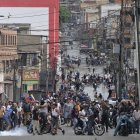
World
Mass protests in Venezuela leave several dead, dozens wounded and shows that most Venezuelans want Maduro ousted
Emmanuel Alejandro Rondón
The preliminary report culminated with a harsh criticism of the Maduro-controlled CNE.
"In the limited number of polling centers they visited, Carter Center observer teams noted the desire of the Venezuelan people to participate in a democratic election process, as demonstrated through their active participation as polling staff, party witnesses, and citizen observers. However, their efforts were undermined by the CNE's complete lack of transparency in announcing the results," it said.
RECOMMENDATION



